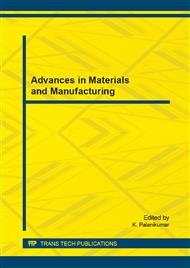p.968
p.974
p.982
p.989
p.995
p.1003
p.1009
p.1015
p.1021
Taguchi Based Optimization of Engine Parameters Using Nanocatalyst with Blends of Biodiesel
Abstract:
Diesel is a primary source of fuel consumed around the globe. Diesel, being a fossil fuel is expected to get over by 2050. Diesel operated vehicles normally emits high level of poisonous gases like NOx, CO2, HC etc. During the various researches, it was being found that vegetable oils exhibit the properties closer to diesel. Few changes in the properties of vegetable oils have resulted in efficient results and allowed us to replace diesel. The present work investigates the emission of diesel engine at various parameters, when lemongrass oil is blended with diesel in various proportions at different levels of injection pressure. The diesel engine was tested on load condition of 25%, 50%, 75% and 100%. Whereas ,injection pressure is varied from 200 to 220 bar at an interval of 20 bar with 10BD, 20BD and 30BD blends of biodiesel. Very small amount of nanocatalytic substance (MgO) is being used i.e. 15ppm, 30ppm and 45ppm to enhance the combustion properties of bio-fuel. The results Shows reduction in NOX HC and CO without sacrificing fuel efficiency. These confirmation results proves that good agreement of predicted values.
Info:
Periodical:
Pages:
995-1000
Citation:
Online since:
June 2015
Authors:
Keywords:
Price:
Сopyright:
© 2015 Trans Tech Publications Ltd. All Rights Reserved
Share:
Citation:


